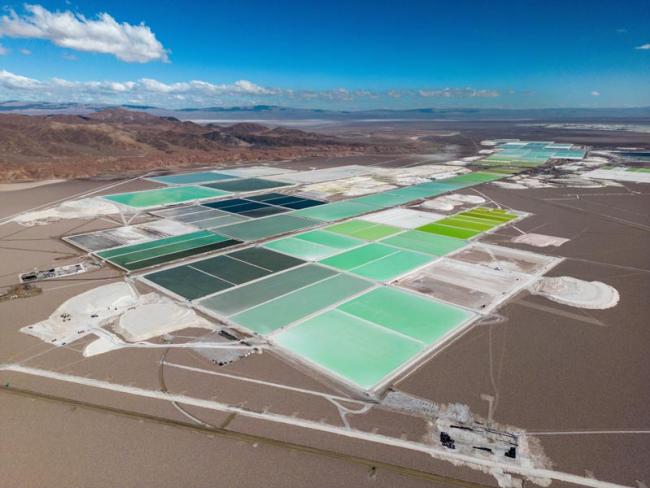
Aerial view of lithium fields in the Atacama desert, Chile. Photo Freedom_wanted/shutterstock.com.
A global competition is under way to secure access to minerals such as lithium and cobalt, crucial to technological development…
The War Below: Lithium, Copper, and the Global Battle to Power Our Lives, by Ernest Scheyder, paperback 384 pages, ISBN 978-1804186374, Ithaka 2025. Kindle edition available.
Ernest Scheyder, a correspondent for Reuters who previously covered the shale revolution in the USA, has written a vivid, many-sided account of the forces shaping the global struggle for control of mineral resources and supply routes.
Scheyder has explored some inconvenient truths and advocated for sensible solutions. Though set in the US, with a side trip to a Bolivian salt lake, and written largely from a business point of view, the book contains much to inform and challenge workers here in Britain.
The discovery of a rare and tender flower, a species of buckwheat, whose only known habitat is a bed of lithium, symbolises the dilemma posed throughout the book. How can preservation of nature and civilisation above ground be reconciled with the invasive extraction of what lies hidden beneath – in this case a giant reserve of key battery metal.
Critical minerals such as lithium, copper and cobalt, and rare earths like molybdenum and thorium, are vital to help adapt to climate change, and are integral to technological development. This means digging more mines.
Competition for the metals is intensifying. National interests are intertwined globally in the quest for energy independence. It’s a conundrum – for the working class as well as capitalists. Outsource the dirty work of extraction, and increase carbon footprint through imports. Or mine in, or as close as possible to, our own backyard.
In Britain we see this contradiction played out over oil and gas extraction and steel production. Scheyder quotes a worker at the Perpetua mining company: “If you want to change the climate, industry has to be part of the solution.”
In charting the steady rise of China, with its methodical state-directed planning, Scheyder exposes the disorganisation, waste, and sheer anarchy of the US economic system. That country is rich in critical raw materials. But it has failed to nurture its own assets, outsourcing its entire rare earths industry to China, including its stockpiles of weapons-grade minerals.
US companies seek whatever they think is profitable. So Ford is to partner with Chinese company CATL to build a battery plant in Michigan. And Bolivia, no longer determined to retain its “lithium sovereignty”, chose CATL rather than a US-led consortium.
Scheyder sympathises with executives who want an unbroken chain of production “from mine to market”. But that’s a pipe dream. The USA itself supplies twice as much copper as China, but is dependent on Chinese processing technology.
Without taking sides, Scheyder points to a disconnect in strategy. Following a one-sided policy of environmental protection, Biden killed off the mining of domestic copper, nickel, cobalt and platinum, and in the process many blue-collar jobs.
Trump’s recklessness is contrasted with Biden’s hesitancy. If he understood nothing else, Trump knew in his first term that he had to move fast on lithium for EVs to compete with China.
Speculative
Scheyder also shows how lithium has become a highly speculative market, notorious for share price-rigging and selling on to the highest bidder. A committed investor is required to risk hundreds of millions of dollars of private capital towards the mammoth task of clearing a tainted site or difficult terrain, building the mining infrastructure, and compensating the locality with schools and hospitals.
Scheyder doesn’t pull his punches about mining conditions – lethal sludge from a breached dam engulfing a community; pipelines leaking radioactive particles; toxic waste scarring the landscape.
‘Scheyder has explored some inconvenient truths and advocated for sensible solutions…’
It doesn’t have to be like this. One of the most gripping passages in the book describes the unexpectedly radical part played by jewellery manufacturer and retailer Tiffany, joining forces with community activists and unions to campaign for responsible mining. Back-room disputes and precipice-edge agreements are narrated in thrilling detail as diverse players, inspired by forestry stewardship, battle to establish international mining standards.
Establishing collaborative control took ten years of compromise and sensitivity to differing topographies, with input from Canada and the World Wildlife Fund, but the end result by 2018 had avoided costly and divisive court battles, and gave encouragement to miners pinning hopes on the transition from iron ore to the metals of the future.
Positive steps are being taken to limit new mines in the future by recycling lithium-ion batteries. Scheyder points to “Daisy”, Apple’s robot for breaking apart an iPhone to its glass, aluminium shell and battery. Recycling reduces landfill and makes up for depleted metal reserves like cobalt and nickel. It speeds up production compared with mining from scratch.
Access to the mineral resources of other countries is behind many of the trade deals that our government seeks, such as the Trans-Pacific Partnership (CTCPP) it joined in December. And it is eyeing up Ukraine too, though the US might think it has priority!
As workers we cannot sit back and trust parliament to act in our interest. Those in power seek to immerse us in the undercurrents of war; this book will inform us about one of the key struggles for resources. And it may help us arrive at some conclusions of our own.
• A longer version of this review is online at www.cpbml.org.uk
